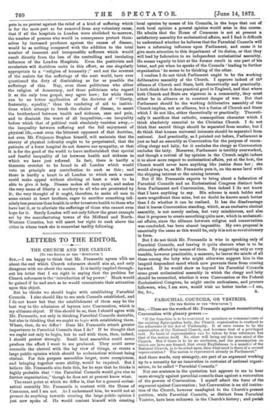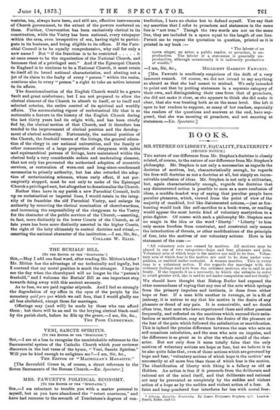PAROCHIAL COUNCILS, OR VESTRIES.
[TO THE EDITOR OF THE SPECTA.TOR:1
Sirt,—These are the words of Mr. Fremantle against reconstituting Convocation with plenary powers :—
"If the franchise is to be restricted to members or communicants of the existing Episcopalian body, the Church organisation is confined to the adherents of the Act of Uniformity. It at once ceases to be the organisation of the National Church, and becomes that of a privileged sect. No basis of representation can be taken by true reformers but that of the nation itself. No other will bring out the true mind of the Church. But if there is to be no exclusion, and the presumption on which our laws are framed, that every Englishman is a member of the National Church, is to be acted npon, then what need is there of a second representation? The nation is represented already in Parliament."
And these words, very strangely, are part of an argument working up to a necessity for an innovation in restraint of national organi- sation, to be called "Parochial Councils."
Not one sentence in the quotation but appears to me to bear more strongly against parochial councils than against a restoration of the powers of Convocation. I myself admit the force of the argument against Convocation ; but Convocation is an old institu- tion of the Church, however unadapted to the Church's present position, while Parochial Councils, as distinct from Parochial Vestries, have been unknown in the Church's history ; and parish vestries, too, always have been, and still are, effective instruments of Church 'government, to the extent of the powers conferred on them. Further, Convocation has been exclusively clerical in its constitution, while the Vestry has been national, every ratepayer 'within the area, even irrespective of sex, having right to partici- pate in its business, and being eligible to its offices. If the Paro- chial Council is to be equally comprehensive, why call for only a new name ? But "if the franchise is to be restricted it at once ceases to be the organisation of the National Church, and 'becomes that of a privileged sect." And if the Episcopal Church in England is to continue to be a National Church, it must retain to itself all its broad national characteristics, and abating not a jot of its claim to the fealty of every " person " within the realm, continue also to every " person " a right to take an active interest in its affairs.
The denationalisation of the English Church would be a grave fault and great misfortune; but I am not prepared to allow the 'clerical element of the Church to absorb to itself, or to itself and :selected coteries, the entire control of its spiritual and worldly affairs. The accumulating vigour of ecclesiastical life that is so 'noticeable a feature in the history of the English Church during the last thirty years had its origin with, and has been chiefly fed by, the clerical section of that Church, and it therefore has tended to the improvement of clerical position and the develop- ment of clerical authority. Fortunately, the national position of the Church, the freehold tenure of the livings, the general educa- tion of the clergy in our national universities, and the family or other connection of a large proportion of clergymen with noble and squirearchical patrons of livings, have maintained within the 'clerical body a very considerable sedate and moderating element, that not only has prevented the authorised adoption of eccentric -services, or restoration of worn-out and long-since-condemned accessories to priestly authority, but has also retarded the adop- tion of sectarianising schemes, whose early effect, if not per- emptorily stopped, must be not only to make of the Episcopal Church a privileged sect, but altogether to denationalise the Church.
Rather than have in my parish a new Parochial Council, built sip on ecclesiastical or imperial lines, I would retain in the integ- rity of its franchise the old Parochial Vestry, and enlarge its authority by removing the clerical nomination of churchwardens, -and increasing the responsibility of the clergyman to the Vestry for the character of the public services of the Church,—asserting, in fact, more distinctly in the lower Courts of the Church, as of late years has been more distinctly asserted in the higher Courts, the right of the laity ultimately to control doctrine and ritual,— 'asserting the national character of the institution.—I am, Sir, &c., COLLARD W. ELLIS.



































 Previous page
Previous page